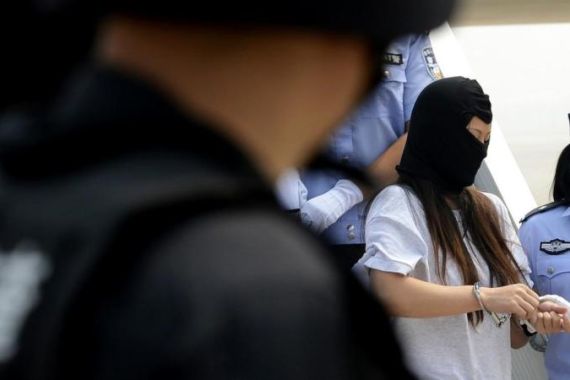Angola extradites suspected Chinese gangsters
Authorities accuse 37 men and women of involvement in criminal acts against compatriots in southwestern African nation.

Three dozen suspected Chinese gangsters accused of criminal acts against compatriots in Angola, have arrived in Beijing under police guard, according to a state media report.
The 37 people are suspected of involvement in kidnapping, robbery, blackmail, human trafficking and forced prostitution, Xinhua news agency quoted the ministry of public security as saying.
Some of the suspected crimes were brutal in nature, Xinhua reported, citing allegations that to extract ransoms some victims had petrol poured on them before being burned and some were buried alive.
Following a request from Chinese authorities, the 37 men and women were extradited on Saturday to China, where they face trial on charges including kidnapping, armed robbery and extortion. They arrived in Beijing on a chartered plane, the ministry said.
Their alleged victims also returned home on the same flight, Xinhua said. China’s CCTV television showed the suspects, handcuffed and their faces largely covered by hoods, being led off a jet at Beijing’s airport and taken away in waiting buses.
Such crimes are a major concern for China, which has become Africa’s main trading partner and a major source of infrastructure investment.
Fertile ground
As a result, many Chinese work in Africa, and their presence has brought problems such as crime among Chinese, especially in politically volatile countries that provide fertile ground for criminals.
It is a sign that Chinese businesses continue to be troubled by the country’s stubborn gang culture as they expand overseas.
As a rising world power, China also wants to be seen as being capable of protecting its citizens abroad and punishing those who commit violent crimes overseas.
The ministry of public security said the Chinese government sent a special police force to Angola in July which worked with local police to break up 12 Chinese gangs, resolve 48 criminal cases and rescue 14 Chinese victims, most of whom had been forced into prostitution.
At home, domestic police arrested another 24 people suspected of being involved in the cases, the ministry said.
Special police teams dispatched to Angola busted 12 criminal organisations and a total of 48 cases in co-operation with police in the West African country, Xinhua said. A total of 14 victims were rescued, it said.
The operation marked the first time that Chinese police had carried out a large-scale operation of that nature in Africa, Xinhua said.
It quoted Liu Ancheng, head of the ministry’s criminal division, as lauding co-operation between police in the two countries.
Businesses targeted
China Police, an online news site managed by the ministry of public security, ran three articles on Saturday on crime fighting in Angola.
In one article, Liu Feng, detective, said many poorly educated, low-income Chinese became gangsters in the southwestern African country.
State media reports said they robbed Chinese businesses and kidnapped Chinese businessmen in broad daylight for ransom.
To protect themselves, Chinese businessmen in Angola hired bodyguards, purchased bullet-proof vehicles, built homes that were difficult to access and disguised themselves when they went out, the article said.
The news site said there were 14 kidnapping cases in 2011 and five people died. Out of fear, many Chinese businesses closed down in the country’s capital, Luanda, and elsewhere, it said.
In addition to government projects, private Chinese businesspeople go to Angola – which is recovering from a civil war that ended in 2002 – for opportunities in trade, construction, retail and food service.
Another China Police article described the experience of two Chinese women lured to Angola with the promise of well-paying jobs in a Chinese restaurant there.
China’s presence in Africa has boomed over the past 15 years as it has sought to tap into the region’s vast natural resources.
China became Africa’s largest trading partner in 2009 and Beijing said last month it would offer $20 billion in new loans to the continent.